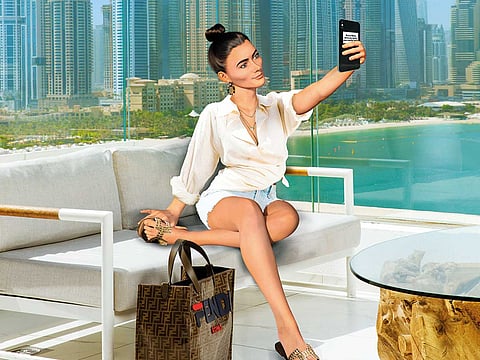Meet the UAE’s first virtual influencer
Known on Instagram as Chasing Laila, Laila Blue is a computer-generated character

Dubai: Known on Instagram as Chasing Laila, Laila Blue is the Middle East’s first virtual influencer, who happens to be based in the UAE.
Who is Laila Blue? She describes herself as a half-French, half-Lebanese 25-year-old who studied motion graphics at a UAE university, and who insists on having the world know her as a humanoid.
She is a fully computer-generated imagery (CGI) avatar with her own interests in fashion, lifestyle, and arts with a passion to spread positive virtual vibes.
Though she chooses not to call herself an influencer, people have already started to give her that label, she says.
I’m just the same as any other avatar... my designer’s aim might be completely different from mine but I can tell you that I’ve been programmed to spread positive, meaningful messages, have fun, make people question things, wear some cool clothes and make some cool art.Laila, artist
“I’m just the same as any other avatar... my designer’s aim might be completely different from mine but I can tell you that I’ve been programmed to spread positive, meaningful messages, have fun, make people question things, wear some cool clothes and make some cool art,” Laila, an artist and a freelance social-media manager for a pop up art space in Al Quoz, told Gulf News.
Recently seen posing in a Fendi dress in a car beside her luggage, Laila added that she is inspired by the growing creative scenes in the region and hopes to contribute to it.
“I believe that culture and society are moved forward by the conversations that creativity can spawn.”
While still fairly new to the virtual world, Laila believes humans can often resist the new and the different. “I know I’m far from perfect, but I want to spread positive virtual vibes to everyone I come across.”
Like most virtual influencers, Laila appears living an aspirational and attractive life on her Instagram page, which is slowly beginning to pick up more followers from across the region. “Some days I feel like a puppet, other days I’m super intrigued for what the future holds for me. I know I have an upgrade coming up soon, too, so that’s exciting,” she said.
Laila believes the future of virtual influencers holds many surprises and they will continue to grow in popularity, but it does not necessarily mean human influencers will no longer have a role to play.
Laila is the product of a time when the lines between authenticity and virtual reality, Facetune and fiction are being increasingly blurred and held up for questioning. She is undoubtedly polarising, and both an exercise in creativity and a comment on the hyperreal, ultra-curated age we live in. Most importantly, however, her existence is designed to spread positive messages and spark meaningful conversations — two things that social media should be responsible for encouraging.Laila’s designer
“I think if a human influencer is genuinely concerned that a virtual influencer will take their place, then they need to re-look at the content they’re creating. I dream of a world where virtual and human influencers can happily coexist, side-by-side. There’s space for all of us.”
Laila’s designer, who wishes to remain anonymous, despite repeated attempts by Gulf News to reveal her identity, said: “Laila is the product of a time when the lines between authenticity and [virtual] reality, Facetune and fiction are being increasingly blurred and held up for questioning.
“She is undoubtedly polarising, and both an exercise in creativity and a comment on the hyper-real, ultra-curated age we live in. Most importantly, however, her existence is designed to spread positive messages and spark meaningful conversations — two things that social media should be responsible for encouraging.”
Should real-life influencers be worried? Hear it from Maria Sakayan
Maria Sakayan, a travel and luxury lifestyle content creator on Instagram, began blogging as a hobby five years ago when she was still living in Sydney. Now living in Dubai, Sakayan who has 108,000 followers on Instagram, shares her views on virtual influencers.
With virtual influencers, [credibility] wouldn’t be possible because consumers won’t be able to connect or relate with the person behind the picture because they are merely fictional characters.

“Although the idea behind virtual influencers is clever, extremely innovative and money-saving, I believe their impact is going to be far more serious and risky to society.” she says.
People have gotten used to real influencers because of their credibility, and this has contributed to the success and growth of many brands.
Real influencers created more loyalty and transparency between influencers and their audiences.
With virtual influencers, this wouldn’t be possible because consumers won’t be able to connect or relate with the person behind the picture because they are merely fictional characters.
Another drawback about these virtual characters is that they create imaginary expectations about what one should be like. This can create serious mental pressures on young people.
In my opinion, virtual Influencers are going to be temporary and competing harder as a real influencer is not an option.”






